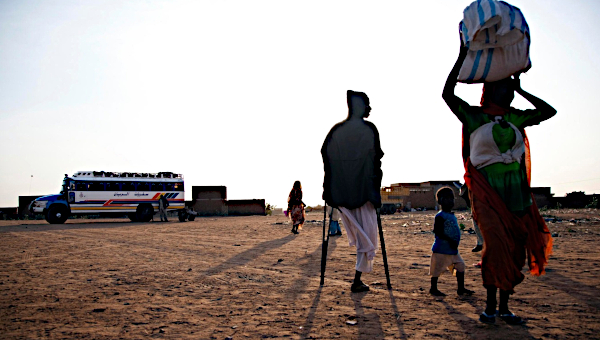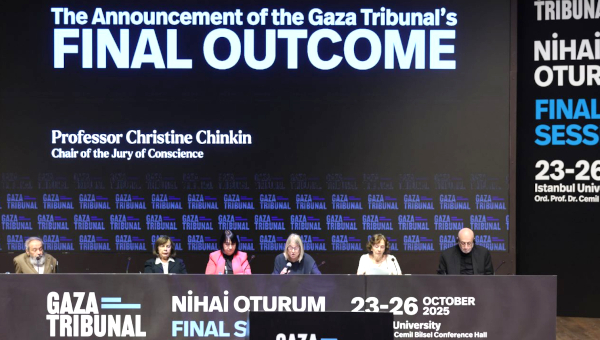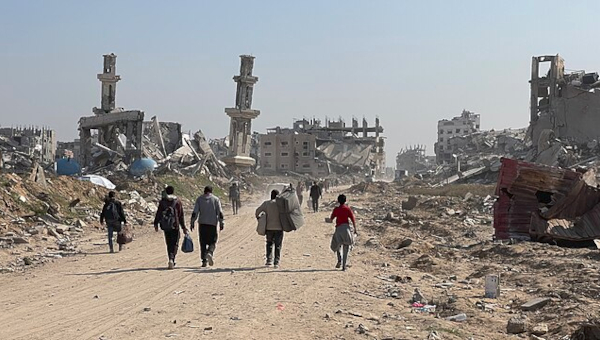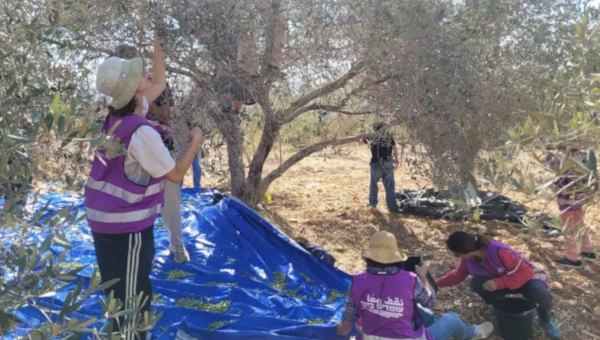Another Front? The Proxy War in Somalia
One of the more interesting things about the North American media coverage on the Middle East is the way it ignores the inextricable political and historical links between those countries located on the northern eastern part of the Red Sea with those located on its southern and western shores. Indeed, one cannot help but wonder if the same ethnocentric logic that imagines Israel as somehow an Ashkenazi, European and more civilized country, is also in operation when the people of Yemen, Sudan, Eritrea or Somalia become the forgotten actors of the Middle East region. This invisibility, of course, suits all the major power brokers in the region except those attempting to build non-sectarian, inclusive societies.
Fortunately for us, in the past week the BBC in addition to most other media outlets has reported that the Ethiopian army (the U.S. ally in the Horn of Africa region) crossed over into Somalia. Some euphemistically call the Ethiopian action an incursion while others call it an invasion. But, whatever one calls it the lack of analysis around the Ethiopian action shows how little people understand of the far-reaching tentacles of the ‘war on terror.’ Important links between events in the northern Red Sea nations and their southern compatriots need to be fleshed out. After all, as Alex de Waal has argued, the rise and fall of political Islam in the Horn of Africa in the 1990s had a tremendous impact on the Middle East region even before September 11th ever happened.
The New Conflict in the Horn of Africa
The latest developments in the Horn of Africa have occurred in the context of the recent military victory in Southern Somalia of the Islamic Courts Union (ICU). I have been told that ordinary people, especially women in Mogadishu, supported the ICU because the alternative they faced was the 15 year ineptitude of so-called secular warlords. These same warlords were recently supported by Ethiopia, the U.S. and the UN to form the present transitional government based in Baidao; yet, rather than bring order, warlords continued to act with impunity. In contrast, the rise of the ICU has brought a measure of stability to Mogadishu for the first time in 15 years. So, although some sections of the ICU would like to import a form of Saudi Wahabism into what is a largely Sufi, and therefore highly tolerant Muslim country, the victory of the ICU must be seen in this context as a partial victory for ordinary people.
However, under the pretext that the ICU are made up of hard core Wahabi type Islamists that threaten stability in the Horn of Africa as well as the transitional government in Somalia, the Ethiopian state has decided to move into Somalia. This is a weak pretext given that residents of Mogadishu have been waiting for 15 years for a transition. Today, it is clear that there is a complicated proxy war happening in the Horn of Africa (one that in fact has been happening since the 90s). In this war the U.S. plays a heavy hand despite their supposed absence from the scene after Black Hawk Down.
The Ethiopian state has traditionally been the strongest state in the Horn of Africa, even in the Ottoman and early European colonial era (until the 1930s). Also it is important in this present conflict to know that until the 1974 Ethiopian revolution the country’s state claimed to be a Christian orthodox state in communion with the pre-Chalcedonic, so called Oriental churches (Coptic, Armenian, etc.), and with unbroken rule since the 4th century. Whatever else this history/myth may be it allows the contemporary Ethiopian state to project a particular kind of Christian image to itself and to the West despite the fact that its demographics tell a different story: half of Ethiopia’s population is Muslim. More importantly, what we can see is that such a strategy of extraversion by the Ethiopian state, for what ever justified or unjustified reasons, radically changes the internal meaning of cultural identities; so that those who were once neighbours and who have little history of religiously based in-fighting are inclined to become enemies.
The U.S. and the Ethiopian Incursion
The other context to the Ethiopian incursion into Somalia (which often uses ethnic Somali Ethiopian soldiers) is thus the unfettered support of the Ethiopian regime by the U.S. government despite the fact that since May 2005 the Ethiopian state has arrested the entire opposition, social justice activists, and shot and killed hundreds of ordinary demonstrators. In fact, what is clear today is that the U.S. has decided that the present Meles Zenawi regime in Ethiopia is the only desirable strong man in the Horn of Africa. One may even go so far as to say that the U.S. indirectly instructed the Ethiopian regime to arrest any alternative vision and players for the region, and thus also to arrest his opposition members as well. The ICU is the first major sustained challenge to both the current Ethiopian state and current U.S. policy in the region. However, part of the price paid for their slight victory is that Somalia may well face a full-scale invasion. And equally important, the Ethiopian Prime-minister will continue to strengthen his hand in the region through the total demolition of the Ethiopian opposition, and all those who may have an alternative, inclusive vision for the region.
The current regime in Ethiopia is made up of a coalition of ethnically based parties led by the Tigrai Peoples Liberation Front (Tigrai is a predominantly Orthodox Christian area in Northern Ethiopia). Prior to 1992, the TPLF was a rebel group whose operations were based in both Sudan and Somalia. In alliance with the Eritrean Peoples Liberation Front (also dominated by ethnic Tigrai people) the TPLF fought a guerrilla war against the Soviet backed regime in Addis Ababa under the pretext of the right to self determination for Ethiopia’s various ethnic nationalities.
It is well documented that at the end of the Cold War and during the fall of the Soviet backed regime in Ethiopia in 1991/92, out of a number of stake holders, the TPLF was brought into the then secret peace talks orchestrated by the U.S. because no one could doubt their military contribution to the demise of the admittedly tyrannical regime of Mengistu Haile-Mariam. However, after the fall of Mengistu’s regime, rather than engaging in a public process of reconciliation, the U.S. treated the Ethiopian state as a prize the TPLF deserved to own as a reward for their contribution to ending communism. Thus, even in 1992 people who were opposed to organizing Ethiopian politics along ethnic lines were brutally killed, tortured and imprisoned. In the mean time, the leader of the TPLF was declared by Bill Clinton to be one of a new crop of African leaders committed to democracy.
One of the results of the 17 year civil war fought against Mengistu’s regime is that it allowed the TPLF and its allies to set up a highly trained military network. It is this network that allows the TPLF to retain power domestically. In addition, this network continues to be perceived by the west as the only institutionalized infrastructure strong enough to counter the so-called Islamist threat in the Horn of Africa. It would seem that the one thing the failed 1993 Operation Restore Hope (when their Black Hawk was downed) taught the Americans is that in order to win a war in Somalia you need soldiers who have an intimate knowledge of the lay of the land. Undoubtedly, the TPLF is the only large U.S. allied army that has that knowledge. Thus, after the failed U.S. operation in Somalia, the Ethiopian state took over as the main foreign intervener in Somalia. As reported by many including the International Crises Group, over the years, the TPLF has confirmed this status by keeping Somalia in a state of utter chaos.
In addition the Ethiopian state has also supported the setting up of Puntland (which is led by the current leader of the Transitional Government in Somalia) as an autonomous and separate state from southern Somalia. Moreover, when necessary, as the New York Times recently reported, the U.S. would supply cash and arms to secular warlords in Southern Somalia (even some of its former enemies) so that the internecine fighting would drag on.
If the end of the Cold War meant that the U.S. would set up in Ethiopia a highly centralized, ethnically based dictatorship, in Somalia it meant war by proxy, chaos and confusion. To be sure, for the people of either country it is sometimes hard to tell the difference.
Of course, it is also hard to imagine how the TPLF would continue to monopolize violence in the Horn of Africa if the U.S. and EU cut the 70% budgetary support it receives in the form of aid packages and loans. The U.S. tells itself that without the TPLF, a power vacuum would be created in the Horn of Africa that would lead to the rise of Islamists. At the same time, the West has all but ignored the massive non-sectarian demonstrations ordinary citizens in Ethiopia have held for the past year. Obviously the U.S. does not see that the people in the region may have other capacities and mechanisms to govern themselves. Nor do they see that by crushing and arresting non-sectarian political leaders (even if based in a religious or ethnic community) they give more breathing space to fundamentalist politics of all stripes. Contrary to the U.S. point of view in the region, and however naively, in the past year ordinary Ethiopians mobilized their own Orange/Rose/Cedar revolution. What they found out is that if Uncle Sam is not interested in regime change demonstrators will be thrown in jail, shot and disappeared.
Somali Democratic Space Blocked
What all this means is that it is impossible in the Horn of Africa for local people to use local institutions to solve problems that are seen by them as local. They become re-interpreted, in the final analysis today, as another of the sinister machinations of the war on terror. For instance, it is my understanding that some women’s organizations in the Horn welcomed the arrival of the ICU; yet, they also said that they would challenge the creation of any new law that claimed that they should dress and act in a tradition that has nothing to do with their mothers (Somali women traditionally do not veil themselves). Instead, local civil society groups favoured the broad interpretation of customary law (pre-Islamic) together with Sharia law, and western law as the basis of a new civil code in Somalia (as is happening in present day ‘British’ Somaliland). In any case this has been, willy, nilly, the practice since the colonial era, but always without the consent of ordinary folks.
Now, because of the Ethiopian/USA incursion into Somalia it is doubtful that we will ever hear the voices of those women who were the most likely people to be capable of articulating a just peace for the Somali people. These women could have used the space opened by the ICU to debate their fate, and international civil society groups could have supported them. Instead, under the current incursion by Ethiopia democratic space has been narrowed to a sliver, and it is most likely that we will have a winner takes all situation. Yet another form of authoritarianism may emerge where everyone will be the loser. In fact, since Ethiopia entered Somalia the ICU has walked away from the peace talks that were taking place in Khartoum and being hosted by the Arab League in conjunction with the African Union. But who would stay at the negotiating table when, behind your back you are being invaded?
If so much of the recent conflict in the Horn of Africa comes down to the ethnic antagonisms created by state manufactured strategies of extraversion, encouraged by the imperialist powers, then all we can hope for now is that in the near future, as in the past, the popular memory of constructive interaction between Somalis and Ethiopians will trump the call to arms issuing from either side of the long Somali/Ethiopian border. If this happens, perhaps soldiers from both Ethiopia and the ICU will simply refuse to follow the wishes of their commanders.
— Herut Berhane is a member of CUPE 3903 in Toronto.
Below are links to a series of articles mentioned in the above commentary, and a letter from the Canadian Labour Congress to the Ethiopian authorities with respect to the detentions of union leaders in the opposition. Also added are other articles that might paint a picture of some of what is going on in the Horn of Africa. Amnesty is also calling for an urgent action on behalf of two professors that are in prison in Ethiopia as part of the opposition.
A good analysis of the ICU: www.justiceafrica.org
Story from BBC NEWS: news.bbc.co.uk
Story about failed CIA involvement in Somalia just before the ICU victory:
www.nytimes.com
International Crises Group Report, Counter-Terrorism in Somalia: Losing Hearts and Minds.
www.crisisgroup.org
Article on political Islam in the Horn of Africa:
conconflicts.ssrc.org
News on Ethiopian Freedom act now before U.S. Congress:
www.ethiomedia.com
Ethiopian opposition view on the war by proxy:
www.addisvoice.com
U.S. troops in strange places:
www.addisvoice.com
Amnesty call to action:
www.amnestyusa.org
CLC Letter: Ethiopia: Teachers, Journalists and
Trade Unionists’ Rights Violated
January 27, 2006
The Honourable Meles Zenawi
Prime Minister
Federal Democratic Republic of Ethiopia
c/o Ethiopian Embassy to Canada
151 Slater Street, Suite 210
Ottawa, ON K1P 5H3
Canada
Re. Ethiopia: Teachers, Journalists and Trade Unionists’ Rights Violated
Dear Prime Minister Meles Zenawi:
On behalf of the Canadian Labour Congress, representing 3 million working women and men throughout Canada, I call on you to uphold the human rights of the many teachers, journalists and trade unionists detained by your government, since November 2005. The whereabouts of some of them are unknown and many have still not been charged nor released.
The Ethiopian Constitution provides that detainees be taken to court within 48 hours of their arrest and informed of the reasons for their detention. While they are waiting for their trials, detainees must have access to legal assistance and be allowed to have visitors. The detainees must therefore be released immediately or charged and brought to court in a fair and transparent process.
Over a hundred teachers, journalists, trade unionists, civil society activists and opposition leaders have been imprisoned in the wake of clashes between protesters and security forces in November. The November clashes followed similar protests in June against election results that the opposition says were rigged. Last Friday again, on January 20, 2006 police opened fire on stone-throwing protesters as annual religious processions were turned into political protests for a second straight day. At least two people were killed and 40 injured in these two days of clashes, according to credible media reports.
On December 16, 2005, fifteen separate charges, including conspiracy, armed insurrection, attempting to subvert the constitution, high treason and genocide, were presented in court by prosecutors against the 131 government opponents and critics detained by Ethiopian authorities, including numerous teachers and trade unionists.
Among those accused are Mr. Kassahun Kebede, Chairman of the Addis Ababa branch of the Ethiopian Teachers Association (ETA), Mrs. Mulunesh Ababayehu, activist member in the ETA Women Wing and Dr. Taye Woldesmiate, ETA President (currently overseas).
Meeting on January 4, 2006, the Second Criminal Bench of the Federal High Court categorically rejected the victims’ appeal to be released on bail. Following the denial of bail, hearings have been adjourned to February 23, 2006.
It is to be recalled that, according to Ethiopian law, being charged of treason does not allow detainees to be released on bail. If found guilty, the accused may face the death penalty. However, defense lawyers have boycotted proceedings for the second time, complaining of being prevented from meeting their clients who, if convicted, face sentences ranging from three years in prison to the death penalty.
These are extremely serious charges. Students’ protests, demanding the release of those detained, have spread to most schools and colleges in Addis Ababa. Students also oppose the act of surrounding schools by armed security forces and soldiers. In Addis Ababa, the Federal police and other security forces broke into school compounds and indiscriminately beat and injured a large number of students and teachers. It is reported that many school girls were severely injured.
The Committee to Protect Journalists reported this week that the Ethiopian government recently expelled The Associated Press correspondent in the country, Anthony Mitchell, who reported news last Friday of renewed clashes between police and protesters in the capital, Addis Ababa. He had to leave on Sunday after government officials gave him 24 hours to depart. Mitchell, a British citizen, who worked in Ethiopia for more than five years, also worked for the U.N. news agency IRIN. The Ethiopian government has imprisoned 16 journalists since November.
The Canadian Labour Congress strongly condemns press freedom violations and the repeated attacks on the integrity and human rights of the Ethiopian Teachers Association leaders and rank and file members. Many of the detained teachers’ spouses have no earnings. With ETA unable to offer financial support as its assets have been frozen since April 1993, the detentions are creating a strain on many families. We fear that this might be another long, arbitrary and non-transparent court case.
The United Nations have been asked by Education International to send a legal observation mission to Ethiopia to assess the validity of the charges, monitor respect for due process at the coming mass trial, and report back to the UN Security Council.
I urge your government to cease this policy of repression of trade union rights, to guarantee the physical integrity and lives of all trade union leaders and activists, and to take action against those police and civilians who have breached the laws protecting trade union rights.
Sincerely,
Kenneth V. Georgetti
President
cc. CLC Officers
CLC Executive Committee
His Excellency Dr. Berhanu Dibaka Kuma, Ethiopian Ambassador to Canada
Honourable Minister, Foreign Affairs Canada
Honourable Minister, Canadian International Development Agency
International Labour Organization
Education International
International Federation of Journalists
International Confederation of Free Trade Unions
International Confederation of Free Trade Unions – African Regional Office





